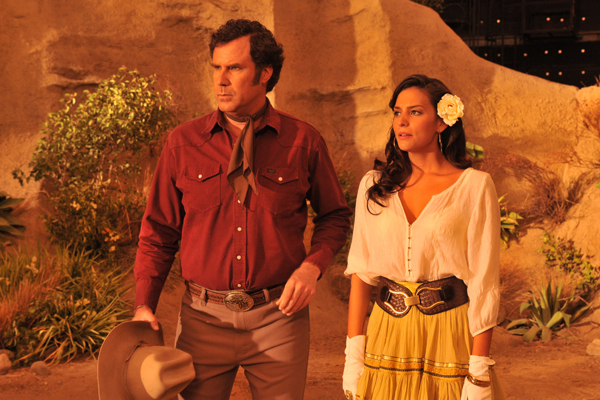Movie review by Greg Carlson
Mexploitation throwback “Casa de mi padre” may not be as satisfying as its surreal pedigree promises, but the Spanish language comedy featuring Will Ferrell as the dim bulb son of a rancher played by the late, great Pedro Armendariz Jr. (to whom the film is dedicated) is recommended viewing for anyone interested in vintage look, z-grade telenovela tributes. As Armando Alvarez, Ferrell delivers his dialogue straight, and press notes made hay with news of the actor’s one-month dialect crash course. Ferrell’s unshakable commitment to character has long been one of his assets, and he carves out a very recognizable persona as an eager-to-please second son yearning to be loved like his older brother.
“Casa de mi padre” echoes the low-fi techniques lovingly reproduced by Quentin Tarantino, Robert Rodriguez, Edgar Wright, Eli Roth, and Rob Zombie in 2007’s “Grindhouse,” including rough splices and print damage. Director Matt Piedmont applies the low-budget, poor production value aesthetic with a wide brush, from ongoing gags involving the liberal placement of mannequins as background “extras” to mismatched continuity within scenes that cut between location photography and studio sets. The silliness extends to the regular appearance of a spirit guide big cat fabricated by the Jim Henson Creature Shop, a handful of musical interludes and an after-the-credits endorsement from a game Dan “Grizzly Adams” Haggerty.
The plot of the movie lifts several of the most recognizable elements of Elia Kazan’s adaptation of “East of Eden,” as well as some of the equally triangular melodramatic whiffs of King Vidor’s “Duel in the Sun.” The filmmakers are certainly affectionate toward their retro inspirations, lavishing the same kind of reverence and attention to period detail “Pootie Tang,” Undercover Brother,” and “Black Dynamite” paid to Blaxploitation. As the beloved first-born Alvarez scion, Diego Luna demonstrates his inner Tony Montana, engaging fellow “Y tu mama tambien” compadre Gael Garcia Bernal in a contest of flamboyant displays of swaggering machismo.
The movie’s firearm and squib count grossly outpaces the ribaldry, and “Casa de mi padre” skips much of the genre’s sleaze. Predictably, however, the opportunities for women within this world are defined by sexuality. Padre Alvarez employs a battery of scantily clad housemaids, but like any number of the film’s visuals, no payoff or reason is offered to explain their attire. Ferrell and co-star Genesis Rodriguez, who plays Armando’s irresistible, soon-to-be sister-in-law, engage in a ridiculous sex scene that fetishizes the male and female derriere to the brink of lunacy.
Current news items covering the brutality of the illegal drug trade in Mexico are a far cry from the bizarre comic treatment of the same themes in “Casa.” Even so, the movie’s lukewarm social commentary, embedded primarily in the officious, racist DEA agent played by Nick Offerman, reminds viewers that stereotypes can be a two-way street (an explanation of the supply and demand economics of cocaine hilariously sees American buyers as “shit-eating crazy monster babies”). The critique is a throwaway, and the agenda of “Casa de mi padre” is more appropriately concerned with Armando squinting into the sunset with “the eyes of a small chicken” while he tries in vain to roll a cigarette.
